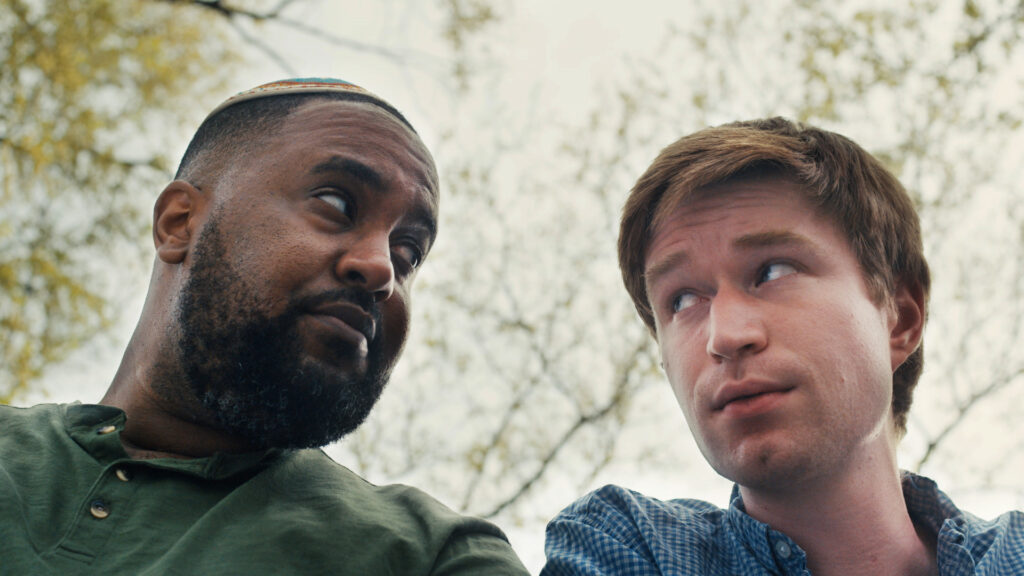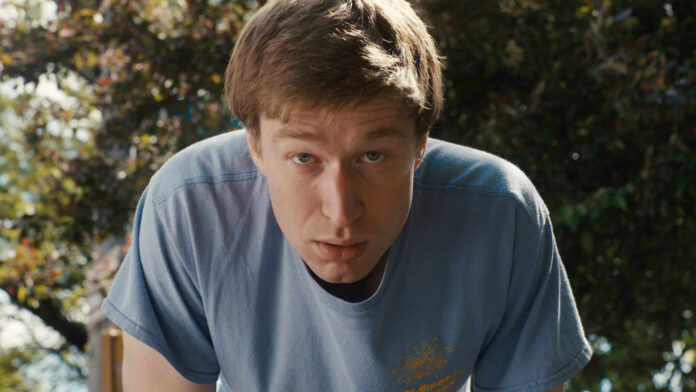As part of the Philadelphia Jewish Film and Media Festival’s Lindy SpringFest, the Jewish Shorts program (April 6 at the Weitzman National Museum of American Jewish History), includes the amusing film, “Half,” by out bisexual writer/director Jacob Roberts. The filmmaker plays Jonah, who has a meet cute on the street with Tom (Matt Walker), a Jewish man who wants to date him. However, Jonah is romantically involved with Cate (Annabel O’Hagan). Realizing he needs to be honest with his girlfriend about his bisexuality, Jonah consults Richie (Ryan Vincent Anderson), a Black rabbi. But Richie’s advice about how to broach the subject may not be best.
The film, which is arguably too short, gives visibility to bisexuals and the inner struggles they have about having to come out and process desires for both a man and a woman. The film benefits from Roberts’ ingratiating performance and mines its humor from nimble wordplay, sight gags and the casts’ crackerjack comic timing.
The filmmaker chatted with Philadelphia Gay News about his film and bisexual visibility.
Can you talk about the episode from your life that inspired this story? Why turn it into a film, and a short film at that?
I turned this story into a film because I felt that I didn’t see a lot of representation of bisexual male stories out there. I felt that if I felt that frustration or lack or representation, that other people did too. This piece isn’t drawing on one corresponding episode in my real life. The Cate character is certainly inspired by people that I’ve dated. My character is not saying or doing things I said or did. But my main feeling is that it’s an interesting and specific part of the bisexual experience of having to come out to a significant other. For most people, openly gay people, or openly straight people, when you are with a new partner, there are no questions about what your sexuality is. When you are bi, people are often operating from that same frame of reference and set of assumptions, so there is an additional step.

You have been frustrated by the portrayal of bisexuals in the media. What can you say about the reality of being bisexual and how your film portrays this topic?
One issue or criticism of the portrayal of bisexual people in the media is perpetuation of stereotypes. One that comes up in film and TV portrayals is the idea that the bisexual person is confused or an unreliable partner. I am aware in the short, I am flirting with those ideas and stereotypes and people could watch the film and feel the stereotype was reinforced, or an endorsement of it, rather than a deconstruction of it. The reality of the experience of being bi can be very confusing, particularly when you are just first stepping into the world and coming to grips with that aspect of yourself. I didn’t want those stereotypes to dictate or constrain my portrayal. It can be confusing, or scary, or overwhelming, and when you are dealing with that, you don’t always make the best decisions. The main character is presented as someone who is in this limbo, and in this new, difficult territory. He is doing his best.
“Half” is about a bisexual, half-Jewish man seeking belonging and not feeling truly a part of one religion or sexuality. The film considers the issues of spirituality and sexuality. Can you talk about your thoughts and observations about religion, sexual identity and cultural acceptance?
Obviously, there is a lot of variation in people’s relations with sexuality from within the Jewish community, and it varies depending on your family’s relationship with Judaism, your denomination. I was thinking about how my religion and sexuality intersected, and there are references in the short to how Judaism is and is not accepting of queer people. My understanding had a lot less to do with the extent to which I was accepted or rejected by Judaism on the basis of sexuality and more to do with this one foot in and one foot out of identity. I felt my halfness, where I had moments of feeling connected, embraced and accepted, and also having moments where I suddenly felt my Jewish credentials were called into question. Why that was so apparent to me was something I realized looking in retrospect at understanding my sexuality and my relationship with Judaism.

To me, “Half” illustrates Jonah’s internal struggle about who he wants to be with, when, and why. It’s interesting that he has no experience being with a man but wants to explore a relationship with Tom. Can you discuss that?
In this particular situation, Jonah is with someone [Cate] he cares about, and has a strong relationship with her, and he recognizes this part of his identity coming to a head. He has to make the decision to stay with [her] and still be himself and bisexual. But while he is with Cate, in this monogamous relationship, he wants to explore this new aspect of his identity and he will have to give up the relationship in order to explore it. That’s the drama of the piece — seeing this character reckon with making a decision and the consequences of that decision.
“Half” will play as part of Philadelphia Jewish Film and Media Festival’s Lindy SpringFest’s Jewish Shorts program at 8:15 p.m. on April 6 at the Weitzman National Museum of American Jewish History, 101 S Independence Mall E. For tickets and more information, visit phillyjfm.org/event/jewish-shorts-springfest-2024/.
